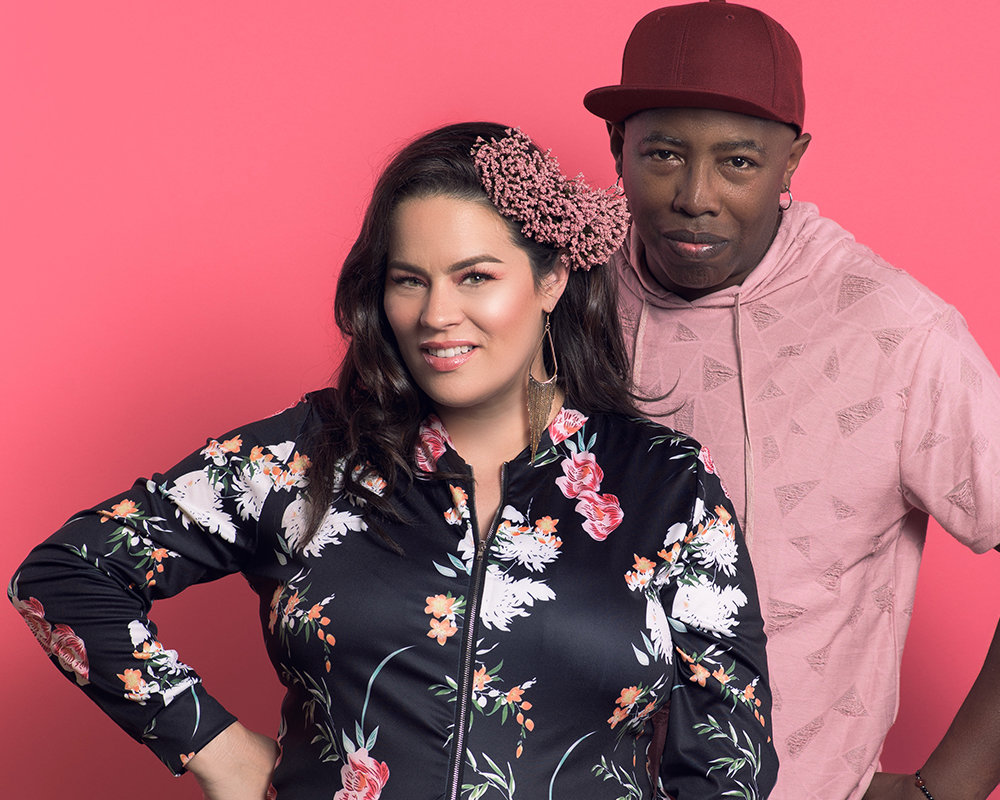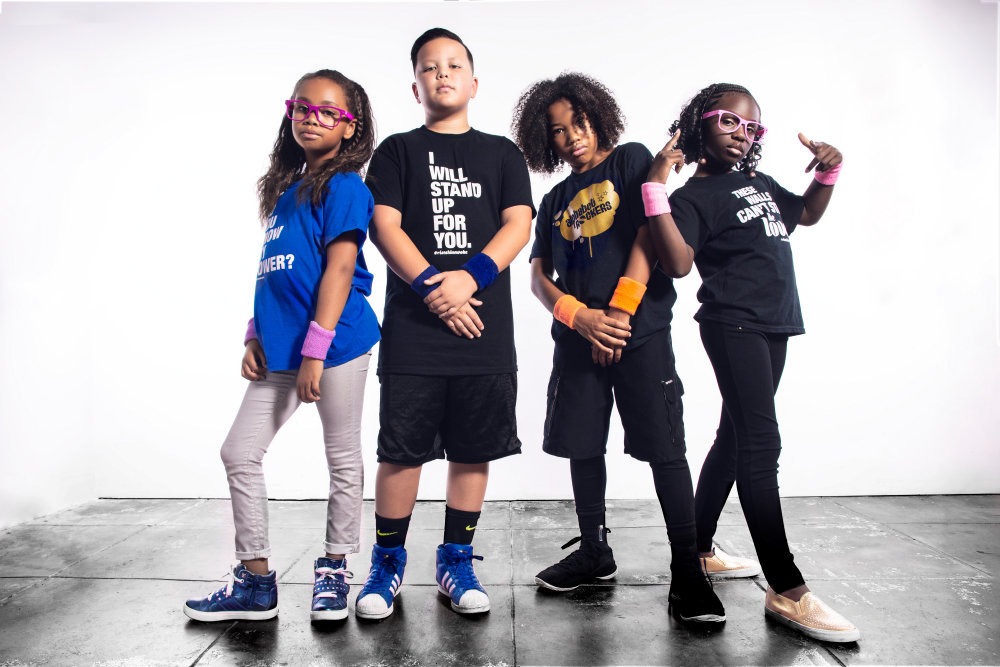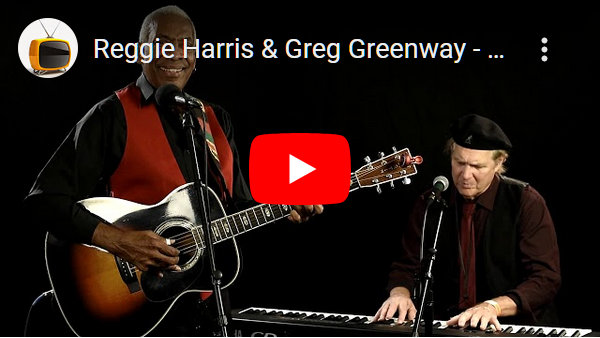Social issues, such as gender identity and racism, are influencing children’s music. This article is about creative ways that two groups of performers address social issues to bring positive change to children’s lives, and to the lives of adults.
One group is the Grammy-nominated Alphabet Rockers, founded by Kaitlin McGaw and Tommy Shepherd. Alphabet Rockers recently presented workshops on racism and bias for the New England and Mid-Atlantic regions of the Children’s Music Network. The second group is Greg Greenway and Reggie Harris, who created a presentation entitled “Deeper Than The Skin.” Reggie and Kim Harris are recipients of the 2018 Magic Penny Award for their contribution to children’s music.
In writing this article, I had the pleasure of talking with both Kaitlin McGaw and Reggie Harris.
Alphabet Rockers
“We make music that makes change” is the mission of Alphabet Rockers. Originally, the Oakland-based group focused on academic themes, such as math skills and nutrition. Over time, they pivoted to social issues that confront children, such as gender identity, racism, and bullying. In crafting their songs and presentations, Alphabet Rockers interview families to ensure that their performances and songs reflect the communities in which children live. The group also enlists the services of educational advisors and community-based organizations.
 The Alphabet Rockers, Kaitlin McGaw and Tommy Shepherd (photo by Nino Fernandez)
The Alphabet Rockers, Kaitlin McGaw and Tommy Shepherd (photo by Nino Fernandez)
Alphabet Rockers perform public concerts for people of all ages. Their audiences number as many as 900 people. Performances begin with a communal handshake. Members of the audience are invited to raise a fist toward the sky to signify that they stand together for justice. When the performers introduce themselves, they model sharing their gender pronouns (he/him, she/her, they/them). The performances include singing, interactive movement, call and response, and reflection. The group’s style of music is a very accessible hip-hop that children enjoy. Kaitlin says that Alphabet Rockers see hip-hop as an equity tool. “We knew that if we put words to hip-hop music, this would result in more learning and more connection.”
 The Youth Rockers (photo by Nino Fernandez)
The Youth Rockers (photo by Nino Fernandez)
Tommy and Kaitlin are joined on the stage by four child performers, the Youth Rockers: Lillian Ellis, Kali de Jesus, Tommy Shepherd III, and Maya Fleming. These fifth and sixth graders have the unusual experience of not only touring with the Grammy-nominated music duo, but also writing and recording in the band’s West Oakland studio, Zoo Labs, after school. They have also carried forward the Rockers’ mission of activism: Lily Ellis, along with Kaia Marbin, initiated the Butterfly Effect to raise awareness of the plight of migrant children at the southern border of the United States. They asked people to send them paper butterflies, one for each migrant child. Their goal was to collect 15,000 butterflies. To date, they have received 40,000. They displayed butterflies in the Senate Rotunda and held a press conference with the Speaker of the House and members of Congress.
According to Kaitlin, the themes of every Rockers performance are “We are all beautiful,” and “I will stand up for you.” To highlight these themes, Rockers sing “Shine,” a song about self-empowerment and loving our skin colors. Kaitlin said, “We must include every child. We are all special. Each one of us needs to find ways to love who we are. We ask the audience to throw shine not shade.”
For school performances, Rockers provide a curriculum, music CDs, lyrics, and dance videos that help children prepare for the concert.
Upon request, Alphabet Rockers provide workshops for families, schools, and educational groups. Recently, Tommy Shepherd and Kaitlin McGaw traveled to Boston to present a workshop for the New England Region of CMN. The workshop included activities, discussions, and songs to help us better address social issues confronting today’s children. During one activity, participants broke into small groups and reflected on when they first became aware of racism. When small groups then reported to the larger group, this activity made it evident that most people in the room began to recognize racial injustice by the age of ten. Tommy and Kaitlin then sang their song “Stand Up for You” to emphasize that children need opportunities to talk about race.
In writing this article, I asked Kaitlin if she had anything more to add about performing. She responded with questions that performers should consider: How do we create space that includes every person? What are we presenting? How do we present in a space?
She added, “Each performer has something beautiful and important to bring. We also have responsibility to look at the skin we present in, the gender we bring to the space, and how we create space for children. Even if we are just going to sing about counting, how do we do it in a way that includes every person?”
Kaitlin believes that everyone is a work in progress. She said that we should ask ourselves: What do we need to let go of? Where do we need to strengthen ourselves to be better?
Deeper Than the Skin
Recently, Reggie Harris joined Greg Greenway on Cape Cod, Massachusetts, to present “Deeper Than the Skin.” Their performance included story, poetry, song, and discussion. They sang traditional and original songs, as well as Sam Cooke’s “A Change Is Gonna Come.” They wove a narrative about slavery, racism, and how this white man and black man became the best of friends. According to Reggie, “The music highlights portions of where the stories have taken us.”
Greg Greenway’s English ancestors lived in Virginia, where 300,000 Africans arrived in the New World to be sold as slaves. Ancestors of Reggie Harris were likely among these Africans. The song “The Skin I’m In” depicts Greg’s attempt to wash his hands of his ancestors. He imagines their response is that they cannot understand his rejection. After all, he is doing well in a society that they helped create.
Reggie Harris sang of his own ancestry in “Hickory Hill,” a song based on a walk he took through a plantation from his family’s past. He walked with a woman who is his cousin from the white side of the family. In the time of slavery, his family name was Hewlett.
 Reggie Harris and Greg Greenway perform “Hickory Hill”
Reggie Harris and Greg Greenway perform “Hickory Hill”
At the show’s conclusion, Greg and Reggie offered the audience a few minutes to share their thoughts. A conversation ensued between audience and performers that lasted forty-five minutes.
At first, Greg and Reggie hoped to perform “Deeper Than the Skin” half a dozen times per year. Currently, they perform it over seventy times per year.
I asked Reggie if combining different components—including singing, listening, storytelling, dialogue, and poetry—makes for a more powerful performance. “Oh, absolutely,” he said. “People don’t all learn in the same way, and they don’t learn from the same types of interactions.” He continued, “Song, narrative, and sharing can open up change in the world.”
Greg and Reggie hope to add a visual component to the presentation in the future. However, from my perspective, the most powerful visual component already exists. It is a black man and a white man standing side by side on a stage, sharing their personal stories against the backdrop of U.S. history, talking about their friendship, performing songs that highlight their stories, and creating a dialogue with the audience.
Conclusion
These performers are accomplished professionals. I was particularly impressed by how deeply Kaitlin McGaw and Reggie Harris have thought about what their groups do on stage and what roles they play in changing lives.
Alphabet Rockers are a great fit for school-age audiences. Their performances and workshops can also enlighten adults about the issues confronting today’s children.
“Deeper Than the Skin” is right for older children and adults. However, Greg and Reggie have fashioned a presentation for younger children. They spent several days at the Woody Guthrie Museum in Oklahoma performing for third and fourth graders, shortening their presentation and using language that reflects the experience of younger children. For instance, they talked about “fairness” and how it can be difficult for some people to become “friends.”
The two groups urge adults to talk to children about social issues such as race and identity. When I asked Reggie if racism is an appropriate topic to discuss with children, he stated, “If you are not doing this by the time they are age six or seven, you are already too late. Kids are more than willing to share their own experiences.”
Both duos explore social issues with their audiences rather than provide definitive solutions, acknowledging that every person is a work in progress. They also constantly analyze their performances to improve them and are mindful of the content they present to audiences. Greg Greenway and Reggie Harris deliberately craft language to give it greater impact. Kaitlin McGaw and Tommy Shepherd select their words with care, for they recognize that children repeat words that they hear.
Can performance truly make a difference in peoples’ lives? According to Kaitlin, “Music bridges the gap between the head and the heart.” Reggie adds, “Story and song touch real human emotion, which is how real change is made.”